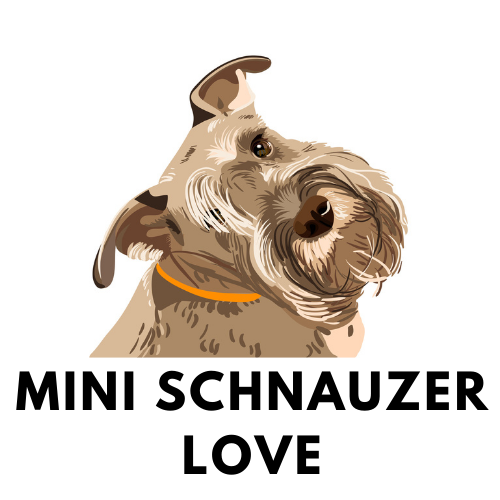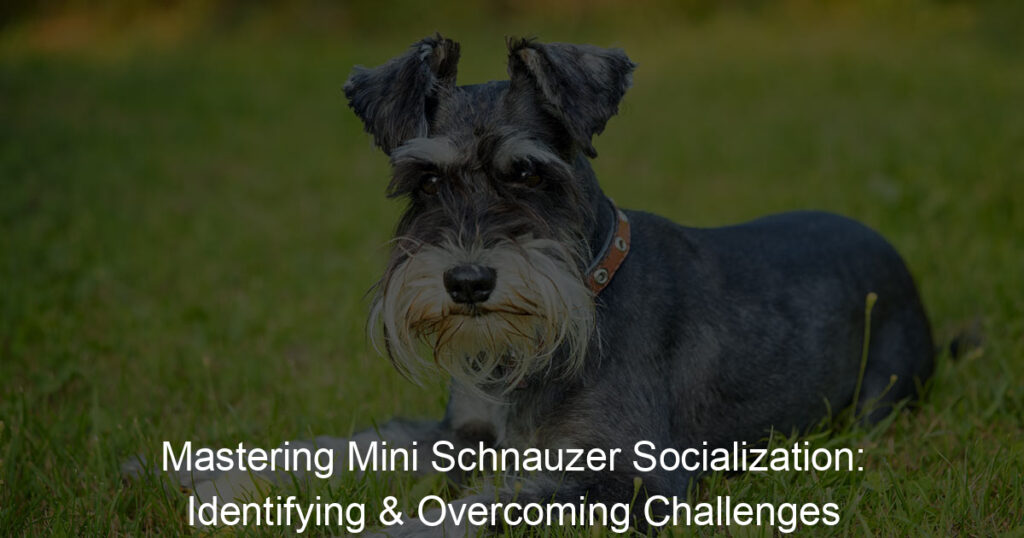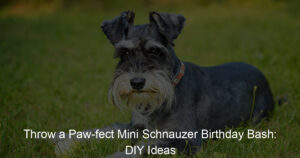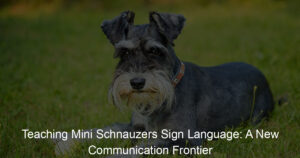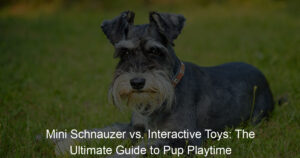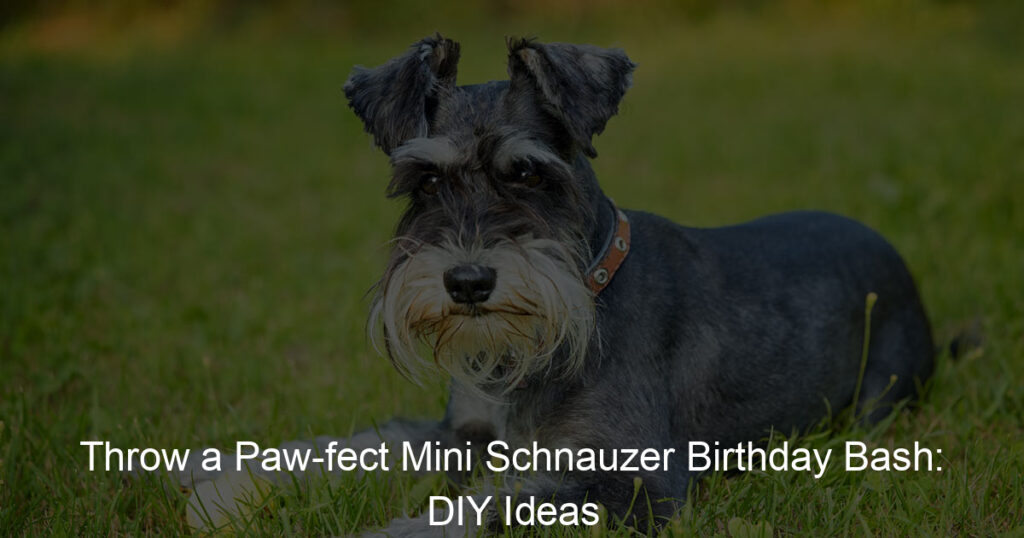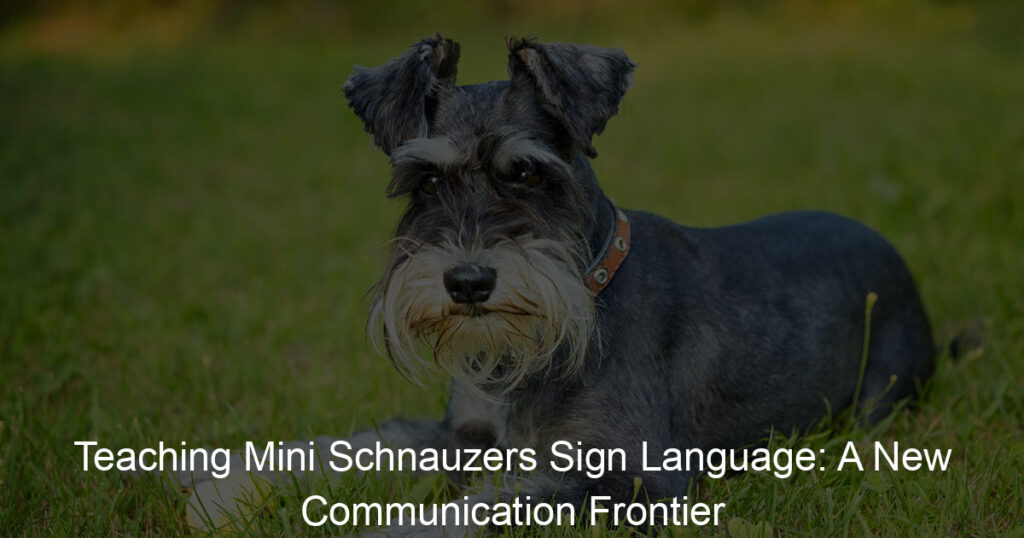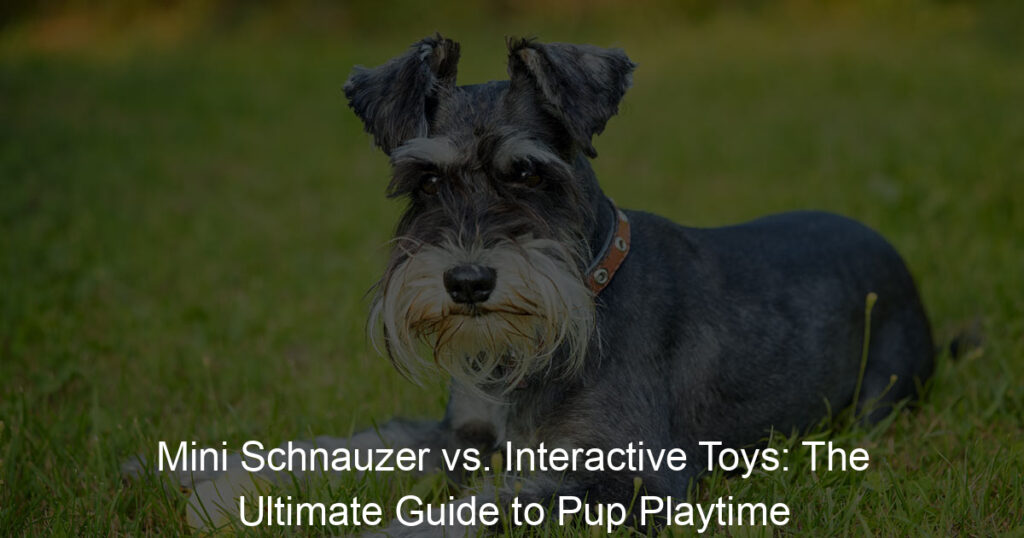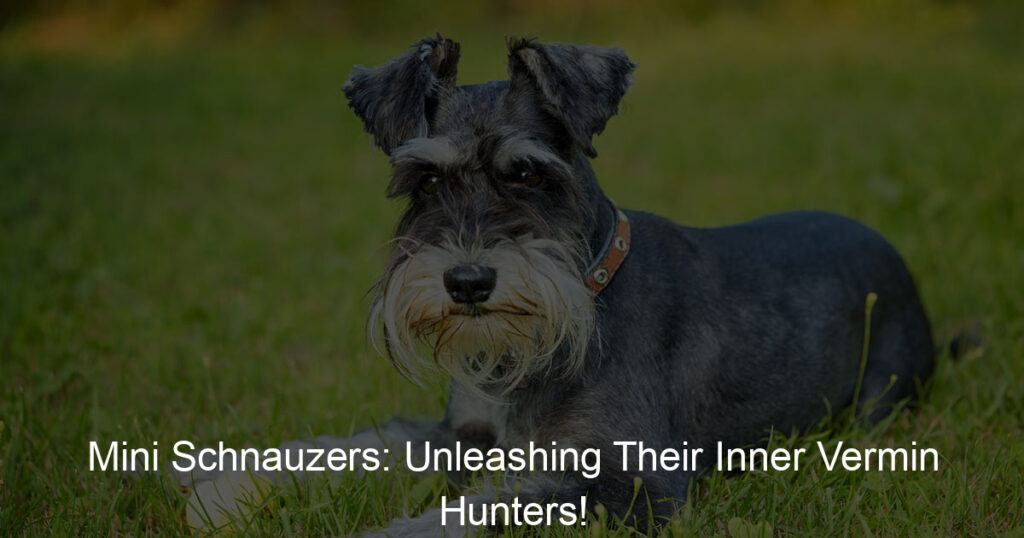
Introduction to Mini Schnauzer Socialization
When it comes to raising a Miniature Schnauzer, one of the most crucial aspects to consider is socialization. This process involves introducing your Mini Schnauzer to a variety of experiences, environments, and individuals, which helps them grow into well-rounded and confident dogs. Let’s delve into the importance of socializing Mini Schnauzers and the benefits it brings.
- Importance of Socializing Mini Schnauzers
- Benefits of Mini Schnauzer Socialization
Like any other breed, Mini Schnauzers need to be socialized from a young age. This is because their early experiences with different people, animals, and environments shape their behavior as they grow older. If a Mini Schnauzer is not properly socialized, they may develop fear, anxiety, or aggression towards unfamiliar situations and individuals. Therefore, socialization is a vital part of their upbringing.
There are numerous benefits to socializing your Mini Schnauzer. Firstly, it helps them become more comfortable and confident in a variety of situations. This means they will be less likely to react negatively or fearfully to new experiences. Secondly, socialization helps to prevent behavioral problems such as aggression or excessive barking. Lastly, a well-socialized Mini Schnauzer is more likely to be friendly and outgoing, making them a joy to be around for both their owners and others.
In conclusion, socialization is an essential part of raising a Mini Schnauzer. It not only helps them become well-adjusted and confident dogs, but it also prevents potential behavioral problems. So, if you’re a Mini Schnauzer owner, make sure to prioritize your pup’s socialization from a young age.
Understanding Mini Schnauzer Behavior Problems
Miniature Schnauzers are known for their lively personalities and boundless energy. However, like any breed, they can exhibit certain behavior problems. Understanding these issues is the first step towards addressing them effectively.
Common Mini Schnauzer Behavior Issues
Let’s delve into some of the most common behavior issues that Mini Schnauzers may exhibit:
- Aggression: Mini Schnauzers can sometimes show signs of aggression. This can manifest in different ways, such as growling, snapping, or even biting. Aggression can be directed towards other animals, strangers, or even their own family. It’s important to note that aggression is often a response to fear or discomfort, and it’s crucial to identify and address the root cause.
- Anxiety: Anxiety is another common issue in Mini Schnauzers. They are a breed that thrives on companionship and can become anxious when left alone for extended periods. Symptoms of anxiety can include excessive barking, destructive behavior, and even attempts to escape.
- Excessive Barking: Mini Schnauzers are known for their vocal nature. While barking is a normal part of dog behavior, excessive barking can become a problem. This can be triggered by a variety of factors, such as boredom, anxiety, or a response to certain stimuli in their environment.
Understanding these common behavior issues can help you better care for your Mini Schnauzer. Remember, every dog is unique and may not exhibit all these behaviors. However, if you notice any of these signs, it’s important to address them promptly to ensure your pet’s well-being.
Identifying Mini Schnauzer Behavior Problems
Understanding the behavior of your Mini Schnauzer is crucial in ensuring a healthy and happy relationship with your pet. Here, we will discuss some common behavior problems and how to identify them.
- Signs of aggression
- Signs of anxiety
- Signs of excessive barking
Aggression in Mini Schnauzers can manifest in various ways. They may growl, snarl, or snap at other animals or people. They may also display aggressive body language, such as a stiff body, bared teeth, or raised hackles. It’s important to note that aggression is often a response to fear or discomfort, so it’s crucial to identify and address the underlying cause.
Mini Schnauzers can also experience anxiety, which can lead to behavior problems. Signs of anxiety may include excessive licking or chewing, pacing, trembling, or hiding. If your Mini Schnauzer is showing these signs, it may be experiencing stress or fear. It’s important to provide a safe and comforting environment for your pet and to seek professional help if the anxiety persists.
Excessive barking is another common behavior problem in Mini Schnauzers. While some barking is normal, excessive or constant barking can be a sign of a problem. If your Mini Schnauzer is barking more than usual, it may be due to boredom, anxiety, or a need for attention. It’s important to address the root cause of the barking and to provide appropriate outlets for your pet’s energy.
Understanding and addressing these behavior problems can greatly improve your Mini Schnauzer’s quality of life and your relationship with your pet. Remember, it’s always best to consult with a professional if you’re unsure about your pet’s behavior.
Mini Schnauzer Training Tips
Training your Mini Schnauzer can be a rewarding experience for both you and your pet. However, it requires a good understanding of the breed’s temperament and a consistent approach. Here are some basic training tips to help you get started.
Basic Training Tips
When it comes to training your Mini Schnauzer, a few key principles can make a significant difference. These include:
- Consistency in training: Consistency is key when training a Mini Schnauzer. This breed is intelligent and quick to learn, but they also require a consistent training schedule. This means you should stick to the same commands, rewards, and consequences every time. For instance, if you’re teaching your dog to sit, always use the same word and reward them in the same way each time they successfully follow the command.
- Positive reinforcement: Positive reinforcement is a powerful tool in dog training. This involves rewarding your Mini Schnauzer when they perform a desired behavior, encouraging them to repeat it. Rewards can be anything your dog finds motivating, such as treats, praise, or playtime. Remember, the reward should be given immediately after the desired behavior to create a clear association.
- Patience and persistence: Training a Mini Schnauzer, or any dog breed for that matter, requires patience and persistence. It’s important to remember that your pet is learning a new skill and it may take time for them to fully understand what you want from them. Don’t get frustrated if your Mini Schnauzer doesn’t get it right away. Keep practicing and eventually, they will catch on.
By incorporating these basic training tips into your routine, you can help your Mini Schnauzer understand what you expect from them, leading to a happier and more harmonious relationship.
Advanced Training Tips
As your Mini Schnauzer matures, you may encounter more complex behavioral issues. Here are some advanced training tips to help you address these challenges.
- Addressing Aggression
- Addressing Anxiety
- Addressing Excessive Barking
Aggression in Mini Schnauzers can manifest as growling, biting, or snapping. It’s crucial to identify the triggers for this behavior. Is it food, other dogs, or strangers? Once you’ve identified the trigger, you can work on desensitizing your dog to it. For example, if your dog is food aggressive, you can train them to understand that they don’t have to guard their food. This can be done by gradually getting them used to you being near their food bowl while they eat.
Mini Schnauzers can be prone to anxiety, often caused by separation or unfamiliar environments. Training your dog to manage their anxiety involves creating a safe space for them and gradually exposing them to the source of their anxiety. For example, if your dog suffers from separation anxiety, you can start by leaving them alone for short periods and gradually increase the time.
Excessive barking is a common issue with Mini Schnauzers. This behavior can be addressed by teaching your dog the ‘quiet’ command. Start by saying ‘quiet’ when your dog barks, then reward them when they stop barking. It’s important to be patient and consistent with this training.
Remember, every dog is unique and what works for one might not work for another. It’s important to be patient and persistent in your training efforts. With time and consistency, your Mini Schnauzer will learn to overcome these behavioral issues.
Mini Schnauzer Socialization Challenges
Mini Schnauzers, like all dogs, can face a variety of socialization challenges. These can range from fear of strangers, other dogs, to new environments. Understanding these challenges and learning how to overcome them is crucial for your Mini Schnauzer’s overall wellbeing and happiness.
- Overcoming fear of strangers
- Overcoming fear of other dogs
- Overcoming fear of new environments
Many Mini Schnauzers may show signs of fear or anxiety when they encounter strangers. This fear can manifest in several ways, such as barking, growling, or even trying to hide. It’s essential to introduce your dog to new people gradually and in a controlled environment. Reward your Mini Schnauzer with treats and praise when they react positively to a stranger.
Interacting with other dogs is a crucial part of a Mini Schnauzer’s socialization. However, some may exhibit fear or aggression towards other dogs. To overcome this, start by introducing your Mini Schnauzer to calm and friendly dogs. Always supervise these interactions and reward your dog for positive behavior. Over time, your Mini Schnauzer should become more comfortable around other dogs.
Mini Schnauzers can also be fearful of new environments. This could be a new home, a different park, or a trip to the vet. To help your dog overcome this fear, introduce them to new places slowly. Start with short visits and gradually increase the time spent in the new environment. Remember to bring along their favorite toys or treats to make the new place feel more comfortable and familiar.
In conclusion, socialization challenges are common in Mini Schnauzers. However, with patience, understanding, and consistent training, these fears can be overcome. Remember, every dog is unique, and what works for one might not work for another. Always approach your Mini Schnauzer’s socialization with an open mind and a willingness to adapt your methods as needed.
Improving Mini Schnauzer Socialization
Improving the socialization of your Mini Schnauzer is a critical part of their development. This process involves introducing them to new experiences, people, and environments. Let’s delve into how you can effectively socialize your Mini Schnauzer puppy.
Mini Schnauzer Puppy Socialization
Socializing your Mini Schnauzer puppy is a vital step in ensuring they grow into a well-rounded adult dog. It’s essential to introduce them to a variety of experiences while they’re still young. Here are some key areas to focus on:
- Introducing new people: Puppies are naturally curious and eager to explore. Introduce your Mini Schnauzer puppy to a variety of people, including children, adults, and the elderly. This will help them become comfortable around different types of people and reduce the likelihood of them becoming anxious or fearful in the future.
- Introducing new pets: If you have other pets at home or in your neighborhood, it’s a great idea to introduce your Mini Schnauzer puppy to them. This will help your puppy learn how to interact with other animals in a safe and controlled manner.
- Introducing new environments: Take your Mini Schnauzer puppy to different environments such as parks, pet stores, and friends’ houses. This will expose them to various sights, sounds, and smells, helping them become more adaptable and confident.
Remember, patience is key when socializing your Mini Schnauzer puppy. Each puppy is unique and will adapt to new experiences at their own pace. Always ensure that these experiences are positive and rewarding for your puppy to build their confidence and trust.
Adult Mini Schnauzer Socialization
As your Mini Schnauzer matures, their socialization needs change. It’s crucial to continue socialization exercises throughout their adult life. This will ensure they remain comfortable and confident in various situations. Let’s delve into the key areas of adult Mini Schnauzer socialization.
- Reintroducing New People
- Reintroducing New Pets
- Reintroducing New Environments
Adult Mini Schnauzers can sometimes be wary of strangers. It’s important to regularly expose them to new people in a controlled environment. This could be inviting friends over who your Schnauzer hasn’t met before, or taking them to public places where they can observe people from a safe distance. Remember to reward your Schnauzer for calm behavior around new people.
Mini Schnauzers are known for their spirited personality, which can sometimes lead to territorial behavior around other pets. To help your Schnauzer get along with new pets, introduce them gradually and under supervision. Start by allowing them to sniff each other’s scent on a blanket or toy. Then, introduce them face-to-face in a neutral area. Always reward positive interactions to reinforce good behavior.
Whether it’s a new home or a new park, changing environments can be stressful for your Mini Schnauzer. To help them adjust, introduce new environments slowly. Start with short visits and gradually increase the time spent there. Bring along their favorite toys or treats to make the new environment feel more familiar and comforting.
In conclusion, socializing an adult Mini Schnauzer requires patience and consistency. But with the right approach, your Schnauzer will be able to confidently navigate new people, pets, and environments. Remember, every dog is unique, so it’s important to tailor your socialization strategies to your Schnauzer’s individual needs and personality.
Conclusion: Mastering Mini Schnauzer Socialization
As we have journeyed through the world of Mini Schnauzer socialization, we have uncovered many insights and strategies. Let’s take a moment to recap and reflect on what we’ve learned.
- Recap of Mini Schnauzer socialization challenges: Mini Schnauzers, like all dogs, face their own unique set of socialization challenges. These include fear of strangers, aggression towards other dogs, and difficulty adapting to new environments. However, with the right training and socialization techniques, these challenges can be overcome.
- Importance of patience and persistence: Patience and persistence are key when it comes to socializing your Mini Schnauzer. Remember, change doesn’t happen overnight. It’s a gradual process that requires consistent effort and understanding. Celebrate small victories and keep pushing forward, even when progress seems slow.
- Final thoughts on Mini Schnauzer social skills: Social skills are crucial for your Mini Schnauzer’s overall well-being. A well-socialized dog is happier, healthier, and more confident. They’re also less likely to develop behavioral problems. So, invest time in socializing your Mini Schnauzer – it’s one of the best things you can do for your furry friend.
In conclusion, mastering Mini Schnauzer socialization is a rewarding journey that enhances the bond between you and your pet. It may be challenging at times, but the end result is well worth the effort. Remember, every dog is unique and what works for one may not work for another. So, keep experimenting, stay patient, and most importantly, enjoy the process.
